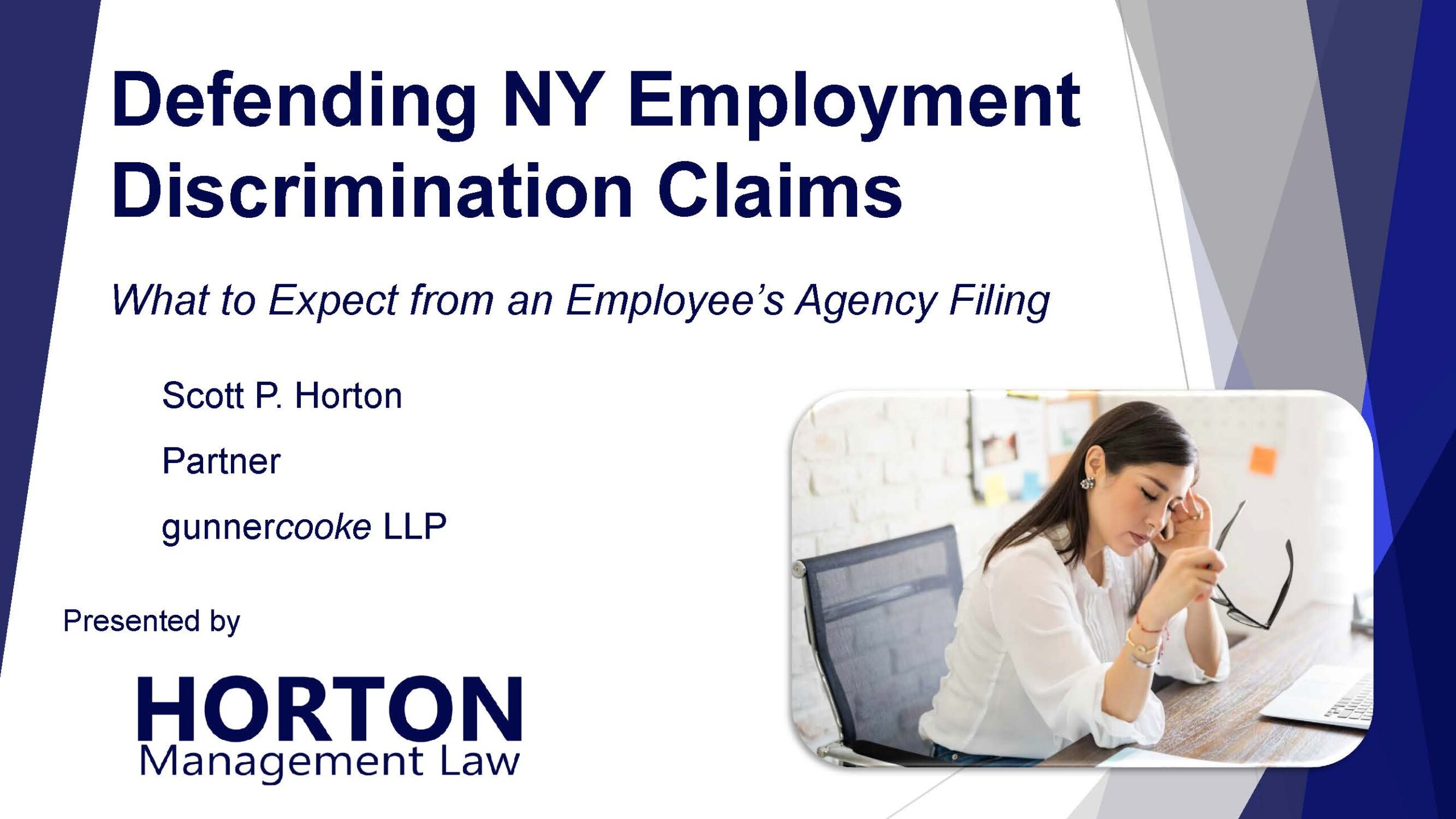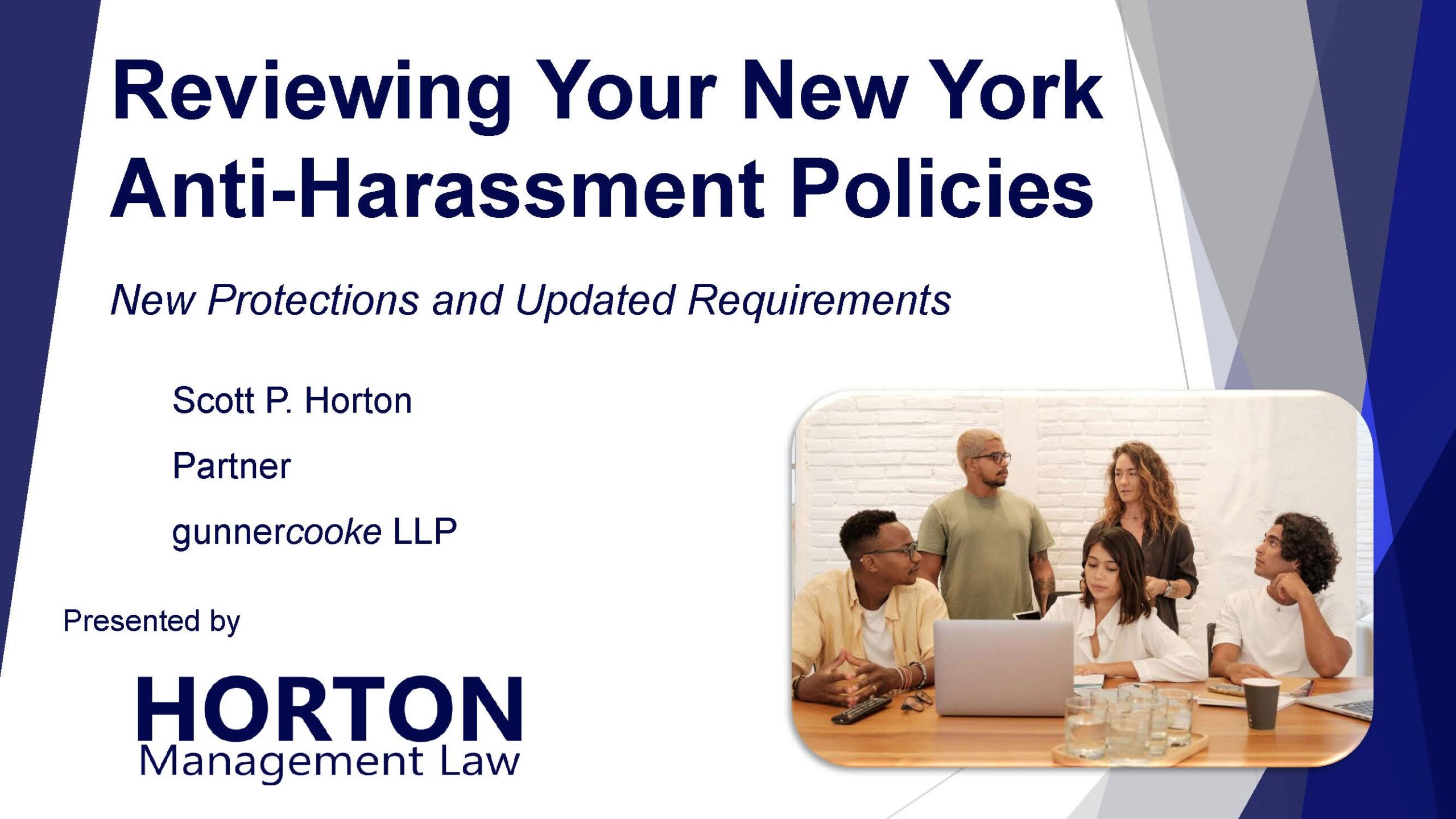On March 16, 2022, New York Governor Kathy Hochul signed legislation aimed at protecting employees from sexual harassment and other forms of employment discrimination. The amendments modify the New York Human Rights Law, which serves as the primary source of New York worker discrimination laws. Some provisions took effect immediately (if not sooner!). A requirement for a new hotline will take effect later this year.
Covered Entities & Workers
One amendment “clarifies” the definition of “employer” under the Human Rights Law. The pre-existing definition was simply and broadly defined to include “all employers within the state.”
In some cases, courts have concluded that this wording did not sufficiently extend the Human Rights Law’s protections to the staff of elected officials or attorneys working for state judges. Accordingly, the law now expressly states that “the state of New York shall be considered an employer of any employee or official, including any elected official, of the New York state executive, legislature, or judiciary, including persons serving in any judicial capacity, and persons serving on the staff of any elected official in New York state.”
The amendment similarly addresses local government entities. It provides that “a city, county, town, village or other political subdivision of the state of New York shall be considered an employer of any employee or official, including any elected official, of such locality’s executive, legislature or judiciary, including persons serving in any local judicial capacity, and persons serving on the staff of any local elected official.”
Rather than merely take effect immediately, this amendment provides that it took effect upon enactment of a previous revision to the Human Rights Law’s definition of employer in 2019. It’s not clear whether courts will actually apply the new definitions retroactively,
Personnel Records Retaliation
In addition to discrimination based on certain personal characteristics, the Human Rights Law prohibits retaliation against individuals who raise discrimination claims or otherwise participate in efforts to redress discrimination. Retaliation is a broad concept under the law. But there is now an express provision ensuring that one form of employer conduct will qualify.
Effective immediately, an employer may not retaliate against a protected employee by disclosing the employee’s personnel files. There is an exception for disclosure in a legal proceeding. But, otherwise, any release of employee information arguably violates the law. This amendment may limit an employer’s ability to publicly dispute even demonstrably false claims by former employees who have alleged discrimination.
Prosecutorial Authority
The New York Attorney General now has the authority to sue an employer for workplace retaliation. This amendment doesn’t prevent an employee from doing so directly in the courts or through a government agency. But it creates a new avenue for prosecuting employers whose employees choose not to make a retaliation claim. This new provision may even permit the Attorney General to pursue a claim where the employee involved has already settled their dispute with the employer.
Sexual Harassment Complaint Assistance Hotline
By July 14, 2022, the New York State Division of Human Rights must establish a confidential hotline “to provide individuals with complaints of workplace sexual harassment counsel and assistance.” The hotline will be available at least during regular business hours from 9:00 a.m. to 5:00 p.m.
The amendment specifies that the hotline will provide a means for workers to connect with “attorneys experienced in providing counsel related to sexual harassment matters who can provide pro bono assistance and counsel.” The attorneys who participate may not solicit the workers they speak with to retain them for representation in the discussed sexual harassment complaint.
While well-intended, there are some questions regarding the logic of this requirement.
First, how willing are such “experienced” attorneys going to be to provide free advice without the possibility for remuneration? Most likely, participating attorneys will typically be pointing employees to file a complaint with the Division of Human Rights. That is effectively the same result as the current scenario where an employee contacts the Division regarding sexual harassment allegations.
Second, why limit the hotline to sexual harassment, which is just one form of employment discrimination prohibited under the New York worker discrimination laws? And most lawyers experienced in sexual harassment claims also handle other forms of discrimination. And, interestingly, the wording of the law doesn’t specifically prohibit the pro bono attorneys from representing (for compensation) the employees who call in claims outside of sexual harassment. Could that create a peculiar incentive for the attorneys to discourage sexual harassment claims in favor of others they may have?
Once in place, information about the hotline will be a component of required employee rights notices and postings.
Complying with Worker Discrimination Laws
These are just the latest developments among a recent trend of stricter worker discrimination laws in New York. Employers must continually focus on preventing harassment and discrimination before it occurs and remedying it as soon as possible if it does. While introducing comparatively few affirmative obligations, these amendments will at least incrementally increase the risk of claims. Strong anti-discrimination policies and training are among the best available measures to avoid improper workplace conduct. But sound overall human resources practices are critical in that mission.
Register for our complimentary webinar on these and other updates regarding worker discrimination laws.


